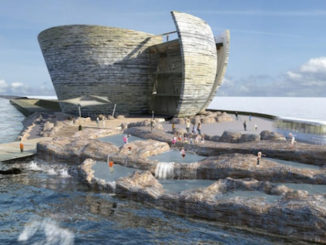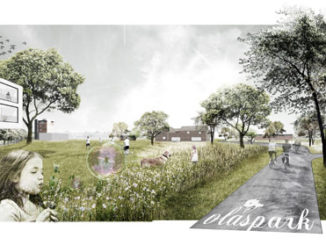Climate change is all about the relationship between humans and the earth’s complex systems. As a profession that works at the interface of built and natural environments, landscape architects around the world are dealing with the impacts of climate change, consciously or not. It is essential that we become aware of the effects that each of our decisions, recommendations, and designs has on the changing climate, our ability to adapt to it, and that we work to achieve positive results.
Climate Action, Now! was the title of our panel discussion conducted at the American Society of Landscape Architecture Conference in 2018. That discussion was a continuation of a climate change primer presented at the 2017 conference by Pamela Conrad, ASLA, of CMG Landscape Architecture and Martha Schwartz, FASLA. The 2018 panel, which also included Colleen Mercer Clarke, CSLA, and Vaughn Rinner, FASLA, discussed what major landscape architecture organizations have been doing relative to climate change, as well as how they are planning for future action. The organizations represented on our panel included the International Federation of Landscape Architects (IFLA), the Canadian Society of Landscape Architects (CSLA), the American Society of Landscape Architects (ASLA), and the Landscape Architecture Foundation (LAF).
Together, we continue to find ways to spread the word about the positive work of landscape architects. We are committed to open communication across the profession, to increase both the body of knowledge on climate action and open access to it, and to speak to a wider audience about the actions landscape architects can take to mitigate the impacts of global warming and to adapt to changing environmental conditions, helping to overcome fear and to initiate insightful action. We believe landscape architects need to collaborate with other professions through shared projects, organizations, and business ventures. We need to think globally, advocate strongly and work to ensure that issues of environmental and social inequity are a major element of our efforts.
Addressing climate change has many aspects, and we believe that we must work on all fronts. Of paramount importance is the immediate reduction in carbon dioxide emissions to the atmosphere, a significant cause of increasing temperatures on earth. We need our work to become “net positive,” to have our projects remove carbon from the atmosphere, not add to it. Offsetting the impacts of our work or “Net zero” is a step in the right direction, but we must strive beyond that. We have the potential to improve the impact of our projects through changing materials selections, but, uniquely, we can also pull CO2 from the air and lock it up in the plants and soils included within our designs.
We also need to assist in the creation and implementation of policies and practices that avoid negative environmental impacts, encouraging reductions of impervious surface, using design strategies to reduce the heat island effect in urban environments, installing green infrastructure to clean and conserve water, and many other strategies necessary to the restoration and maintenance of needed ecosystem services. We need to think and act beyond boundaries, planning and designing for adaptation and resilience in our communities. We need to incorporate climate positive policies in our own practices and encourage planning commissions and local, state, and federal lawmakers to mandate mitigation and adaptation in new projects as well.
We believe that an important initiative in climate action is the development and implementation of existing and new tools and methods that evaluate the climate performance of our projects. Fortunately, the profession is increasingly focused on this science. We need to experiment, to test new ideas and modify our methods. We need to set performance goals early in the design process, monitor change and evaluate how well projects meet environmental quality goals. We also need to report on results and share information with landscape architects and other designers, with developers, and with public servants. We need good information in order to do better.
To improve the sharing of information, landscape architects, together with other allied professions and scientists, are collaborating to identify and to minimize knowledge. LAF, with its focus on education and research, provides a wide variety of resources in the Landscape Performance Series and is releasing a guidebook to evaluate landscape performance in March 2019. The ASLA recently released a Landscape Architecture Technical Information Series (LATIS) A Landscape Performance + Metrics Primer, prepared by Emily McCoy, ASLA, of Andropogon Associates. Pamela Conrad, ASLA, is creating a Landscape Carbon Calculator for use on site projects, and in June is launching a Climate Positive Design website to make this tool as well as other resources and guidance available to help improve each individual project and our profession’s climate impact through science-based design. The International Federation has released its Global Accord -adaptation for a changing world and the Canadian Society of Landscape Architects provides free online access to its four Adaptation Primers.
Landscape architects have a unique understanding of the complexity and dynamics of earth systems relative to human communities. We need to use this knowledge and understanding to help our communities at every level to become active in implementing the multiple changes that each person can undertake to rebalance our relationship to the global environment, to help the earth to remain a healthy place for human society. Communication is critical to all that we do.
To receive notification of the Climate Positive Design/Landscape Carbon Calculator launch in June, email ClimatePositiveDesign@gmail.com. To be alerted when LAF’s Evaluating Landscape Performance: A Guidebook for Metrics and Methods Selection is published, sign up for LAF’s email list.
Response from:
Colleen Mercer Clarke, Ph.D., FCSLA
Martha Schwartz, DSc, FASLA, Hon FRIBA, Hon RDI, RAAR
Pamela Conrad, ASLA, PLA, LEED AP
Vaughn Rinner, FASLA, PLA, SITES AP



